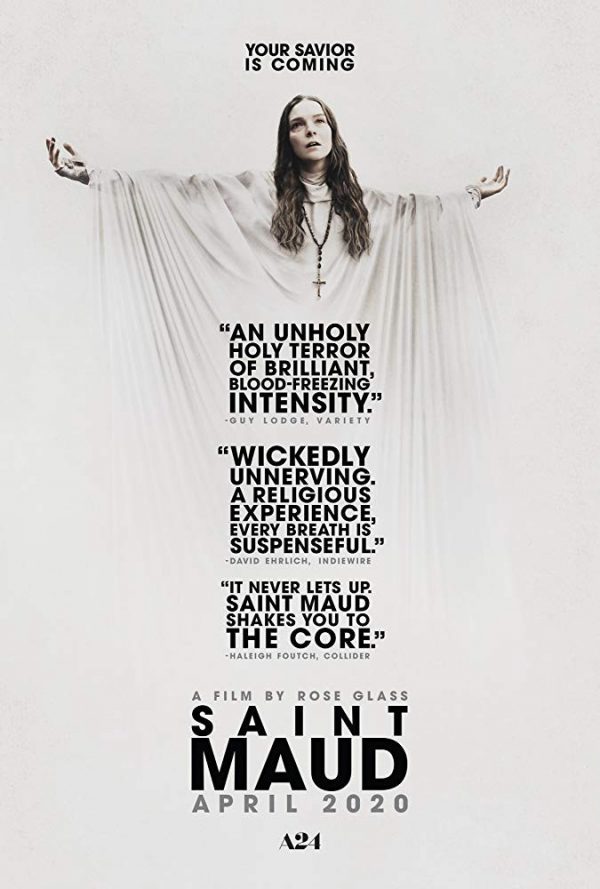Saint Maud, 2020.
Directed by Rose Glass.
Starring Morfydd Clark, Jennifer Ehle, Lily Knight and Lily Frazer.
SYNOPSIS:
A pious nurse begins caring for a terminally ill patient, and takes the task of saving her soul extremely personally, leading the nurse down an increasingly dangerous and violent path.
The new horror, Saint Maud, is arguably the centrepiece of this year’s Fantastic Film Festival Australia. Distributed by A24, the studio behind such recent hits as The VVitch, Hereditary and Midsommar, the hype for Saint Maud has been at fever pitch since its trailer surfaced in December. Saint Maud fits comfortably aside those aforementioned great movies, with director Rose Glass crafting an emphatic statement-making debut feature.
Set in a drab and dreary Northern English seaside town (unmistakably shot in Scarborough), the film follows the titular Maud (Morfydd Clark). She is a newly devout nurse with a dark past who, after a dreadful accident in a hospital, takes on a new role as a carer for a terminally ill patient, Amanda (Jennifer Ehle). Having been a successful dancer in a previous life, Amanda is now left bitter and depressed by her situation. The only comfort she finds is in the parties she throws and the relationship she holds with her casual lover Carol (Lily Frazer). As Maud and Amanda’s friendship develops so too does Maud’s belief that she is little closer to God than everybody else. Soon this deep, personal and very unsettling connection with a supposed higher power manifests itself in increasingly violent ways.
Director and writer Rose Glass has been a rising star in British horror for a number of years, and Saint Maud will certainly be her breakout film. Her script is lean, direct and utterly enticing, a slow burning tale which flickers and flashes with pure terror, and explodes in the searing finale.
Morfydd Clark in the lead role as Maud is intense and at times terrifying. She is in every scene and dominates each one completely. Her performance as the complicated Maud is a full throttle one, executed with a great maturity. She is asked to flit between the angelic Saint Maud and the girl Maud used to be, and in both, Clark is believable and compelling. One moment she is timid and unsure, and the next she is uplifted, infused with the euphoria of the Lord. It takes a lot of skill on Clark’s part to pull off, especially in the scenes in which she feels a deep communication with God. In other hands, they could be cheesy and frankly laughable moments but Clark’s execution leaves the audience perturbed and unsettled in the best way. It is no exaggeration to say that Clark joins Toni Collette (Hereditary) and Florence Pugh (Midsommar) in the A24 pantheon of great horror protagonists.
Glass and Clark are aided in their efforts by the production design, set decoration and cinematography which together really help set Saint Maud apart from many of its contemporaries. The seaside has never looked so depressingly bleak in its washed-out colours and kitschy arcade lights. These design choices only further the to-and-fro struggle at the centre of the film, between archaic ideals and underwhelming modern life. The town is stuck in the past, but has a coat of tacky modernity plastered on. Maud herself battles to follow the stringent rules of her newfound religion whilst being engulfed in the wickedness of the present day.
What makes the film so compelling is that we as an audience, are locked into Maud’s point of view throughout. Keeping the camera almost always so tight to her is a fascinating choice, and therefore our understanding of this world is fed directly through her. We see the same four walls of her tiny bedroom in all its dreariness and we feel her innermost worries and excitements. It is a fascinating way of building dread. Seeing the world this way, we the audience are never sure of whether we are seeing reality or are just stuck in the mind of a potentially unhinged protagonist.

Narration is also used and perhaps surprisingly, it never detracts or distracts from the tale, but in fact plays nicely into the intimate religious aspect of the film. Accompanying narration another key element that cannot be ignored is the music of Adam Janota Bzowski. Whilst his epic, sparse, at times apocalyptic score isn’t exactly ground-breaking, it imperceptibly adds another layer to this already tense and intriguing tale, and again compliments the religious themes Glass is exploring.
Despite its short runtime, Saint Maud is surprisingly packed to the brim with ideas and themes, and is much deserving of the deep-dive essays that will no doubt follow its release. Crucially though, the film does not coast on subtext, but instead delivers a brilliant thriller independent of this.
Glass’ debut fits perfectly under the A24 banner, a smart, intense horror with a barnstorming central performance from Clark. It doesn’t have quite as many of the traditional scares of Hereditary, but it makes up for it with disturbing imagery and a dread that seeps under your skin and haunts you for days. Saint Maud is the first great horror film of 2020.
Saint Maud screens at the Fantastic Film Festival Australia in both Sydney and Melbourne. The screening on Sunday 1st March in Sydney will include a Q&A with director Rose Glass.
The Festival will run until Wednesday 4th March. For more information please check out the website here.
Flickering Myth Rating – Film ★ ★ ★ ★ / Movie ★ ★ ★ ★
Matthew Singleton














